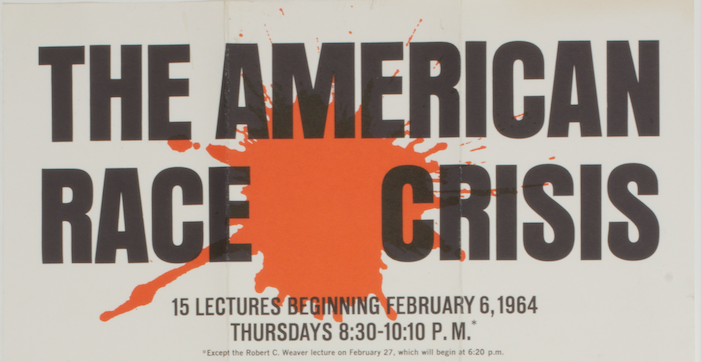
New School History: The American Race Crisis
In 1964, the New School community was treated to a lecture series featuring a who’s who of civil rights luminaries. Notable figures including Dr. Martin Luther King Jr.; playwright and actor Ossie Davis; James Farmer, national director of the Congress of Racial Equality (CORE); author and screenwriter John O. Killens; and Bayard T. Rustin, deputy director of the March on Washington took part in a special 15-week lecture series called The American Race Crisis. Open to the public as well as students, the lectures covered topics including federally funded housing, job creation, urban renewal, and school desegregation.
How did all these civil rights leaders end up at The New School? It started with the turmoil of the previous year — the 100th anniversary of the Emancipation Proclamation — when many key events in the civil rights struggle took place: the lunch counter sit-ins and boycotts in Alabama, the March on Washington for Jobs and Freedom in August, the bombing of the 16th Street Church in Birmingham that killed four little girls in September.
Daniel S. Anthony, a professor at The New School and the executive director of the Newark Human Rights Commission, was disappointed by the university’s failure to address the significant events unfolding in the United States. He wrote to the dean, William Birenbaum, that he was “somewhat shocked to find so few courses in the 1963 Bulletin relating to the Negro Revolt taking place in America.”
Anthony went on to present an “exciting offer” that would rectify this oversight: the creation of a lecture series exploring these momentous events. He proposed bringing civic leaders, artists, and activists representing a range of viewpoints — from the moderate to the militant — to examine the full spectrum of thought around civil rights issues. Birenbaum welcomed Anthony’s proposal, as it aligned with his attempts to build relationships with the African-American community.
The program opened on February 6, 1964, with a lecture by Dr. Martin Luther King Jr. He set the tone for the series, asking “Why did this revolution occur in 1963?” King pointed to a range of causes: the glacial pace of school desegregation, the failure of both political parties to fulfill their promises, and the inspiring example set by the decolonization efforts underway in Africa and Asia. He argued that it was natural that by 1963 Black people “would rise with the resolution and demand a share of governing power, and living conditions measured by American standards rather than by the standards of colonial impoverishment.”
The lecture series could not have been more timely: Just three days before King’s speech, 460,000 Black and Puerto Rican students participated in a one-day boycott targeting the separate and unequal conditions prevailing in the public schools. That protest, one of the largest of the civil rights movement, was led by Brooklyn minister Milton Galamison and organized by Bayard Rustin; both men would participate in the lecture series.
Today the New School Archives and Special Collections maintains a collection of materials from the series, including posters, letters, transcripts, and announcements of the lectures, as well as recordings of the talks. Now anyone with an Internet connection can relive lectures by Dr. King and other prominent figures addressing a pivotal moment in U.S. history.


